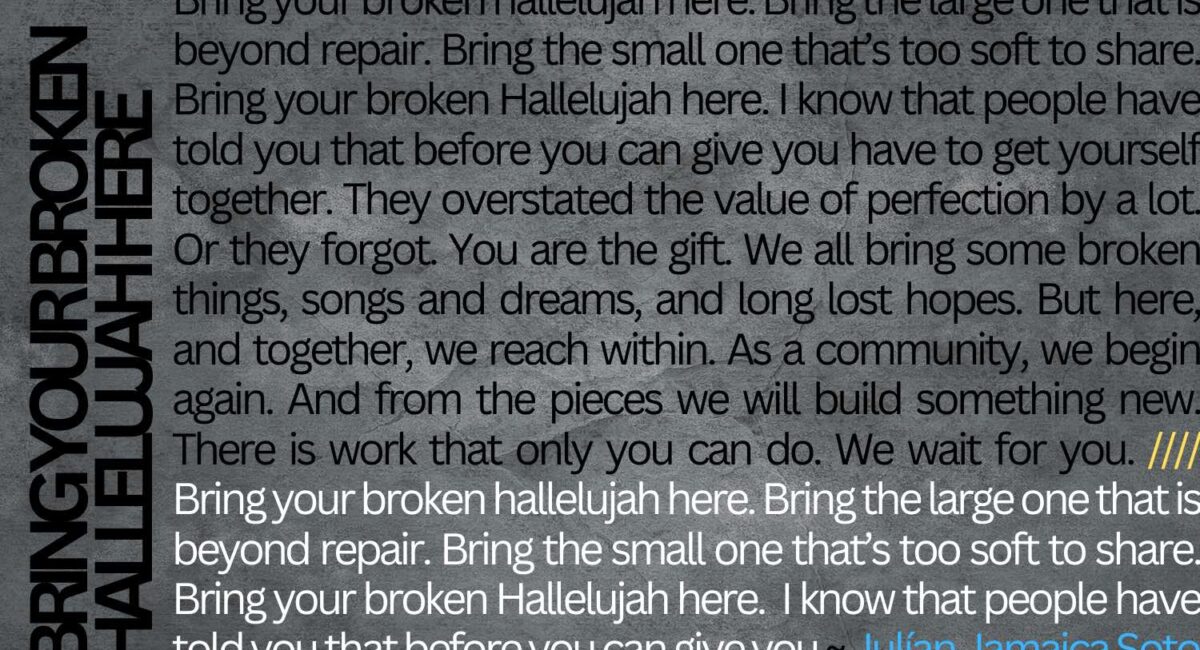First Unitarian Universalist Society Burlington
February 4, 2024
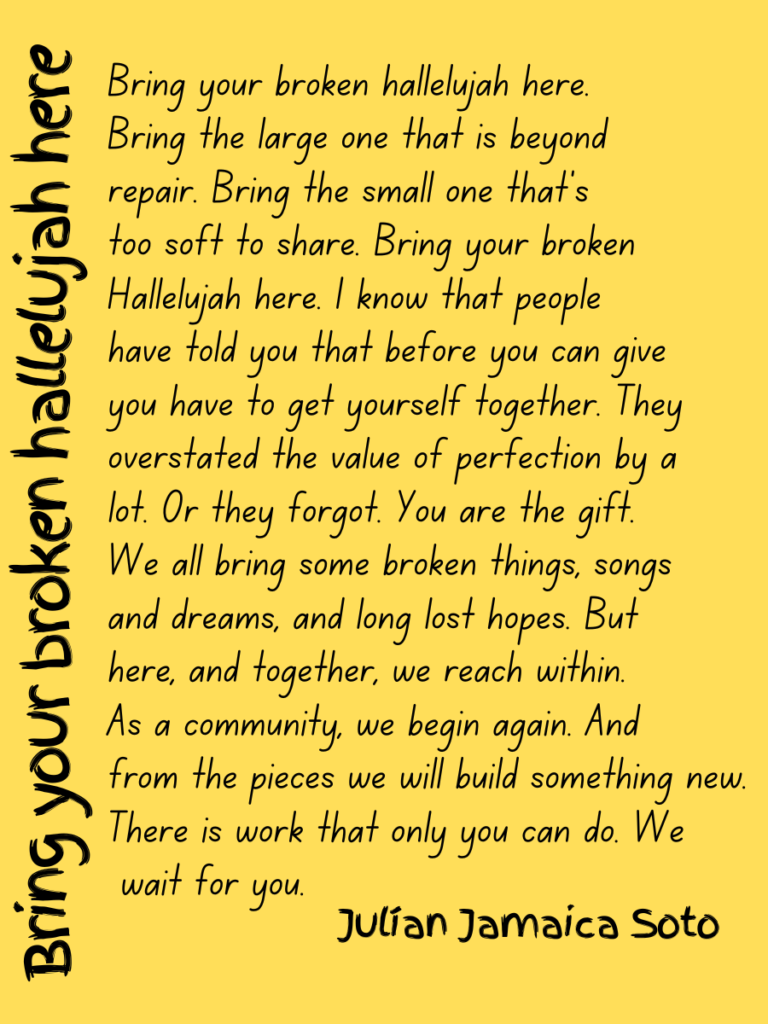
The birds they sang
At the break of day
Start again
I heard them say
Don’t dwell on what has passed away
Or what is yet to be
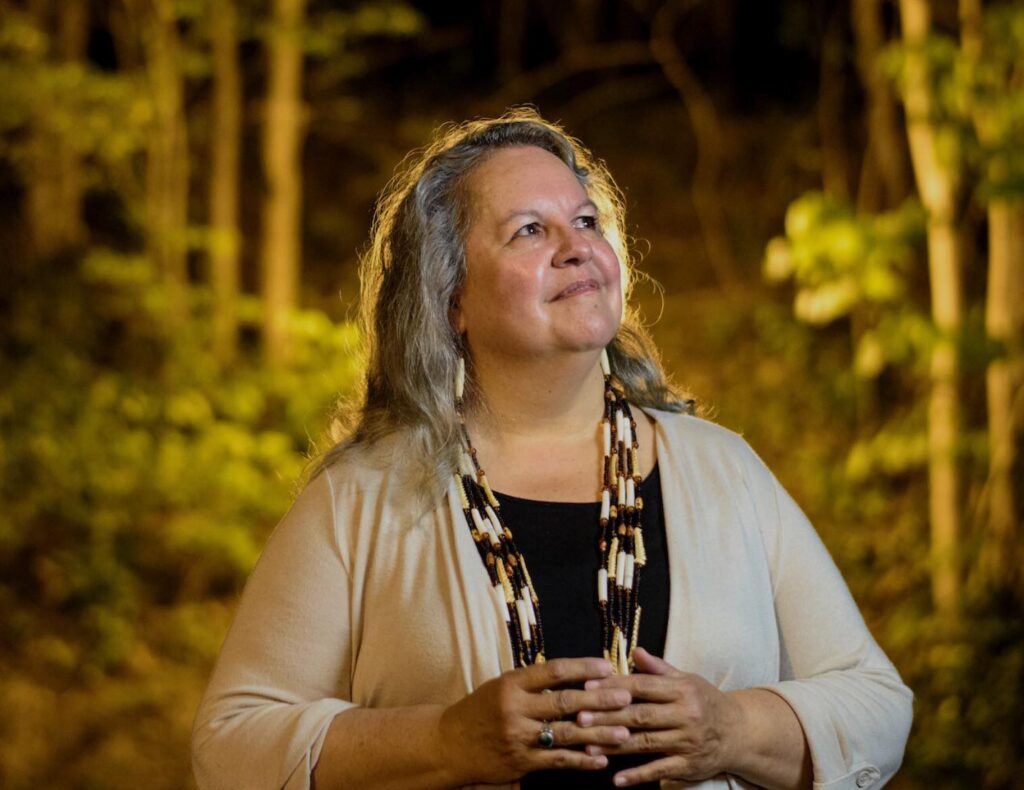
In reflecting on her namesake bird, biologist and author Robin Wall Kimmerer, who is a citizen member of the Potawatomi nation, writes about the gift economy within the Natural World. Specifically, the gift economy between a favorite berry of hers called, strangely to my ears, “serviceberry,” and other living entities, particularly those that sing at the break of day: those feathered entities called birds.
She writes of how those berries feed the robins. How the digestive processes of the birds make the seeds available for fertilization by scarifying the hard outer core so that when they exit they are more ready to sprout. How the birds, as they fly, spread the seeds that become plants that become berries that become nourishment.
Kimmerer encourages us to consider this natural gift economy as inspiration for human economies. She encourages us – another way of saying, she gives us courage – to consider not scarcity and demand as the basis of our economics, which is what mainstream economic theory uses as building blocks, but abundance and mutual reciprocity.
In her rich essay, “The Serviceberry: An Economy of Abundance,” she tells the story of an indigenous community in Brazil visited by an anthropologist seeped in the Western bias of scarcity. After a long period of no hunting success, one of the indigenous people had just successfully killed a deer and brought home the prized meat. Curious by profession, the anthropologist asked what the hunter intended to do with the meat he could not eat that day. Now, the community had the technology to preserve it – smoking, salting, drying. Yet, the hunter planned a feast for his neighbors.
When the Westerner asked why he did not store it for his own later use, the hunter said, incredulously: I store my meat in the stomach of my neighbor.
Ring the bells that still can ring
Forget your perfect offering
Another story. There are two individuals, unknown to each other. The first gives $1000 and the second gives $50 to the same non-profit for a cause important to their hearts. The non-profit organization benefits from having $1050 to use to further their mission: good news! Each of the donors receives a thank you letter from the development department of the non-profit. However, if the development department at that non-profit were pressed to share their assessment, they would say that the $1000 donation is closer to perfect than the $50.
If we were to use the standard metrics of our current economic system to determine which of these two individuals was more generous, what is our answer?
[the one who gave $1000]
Yet, there is more to the story. The first individual has $100,000 in savings. (Wouldn’t that be nice!) So their gift equals one percent of their savings. The second person, who gave 1/20 the amount of the first ($50, not $1000), has $1000 in savings. Their gift was 5% of their savings.
What is our answer now, of who is the more generous of the two?
While Christian scripture is not my strong suit, there are some parables that really resonate with me. One of these is Luke 21:1-4. This is the story when Jesus celebrates the poor widow who gives two small copper coins, while he admonishes the rich people who had given a higher amount of coins, but what is, in fact, a lesser percentage of their resources.
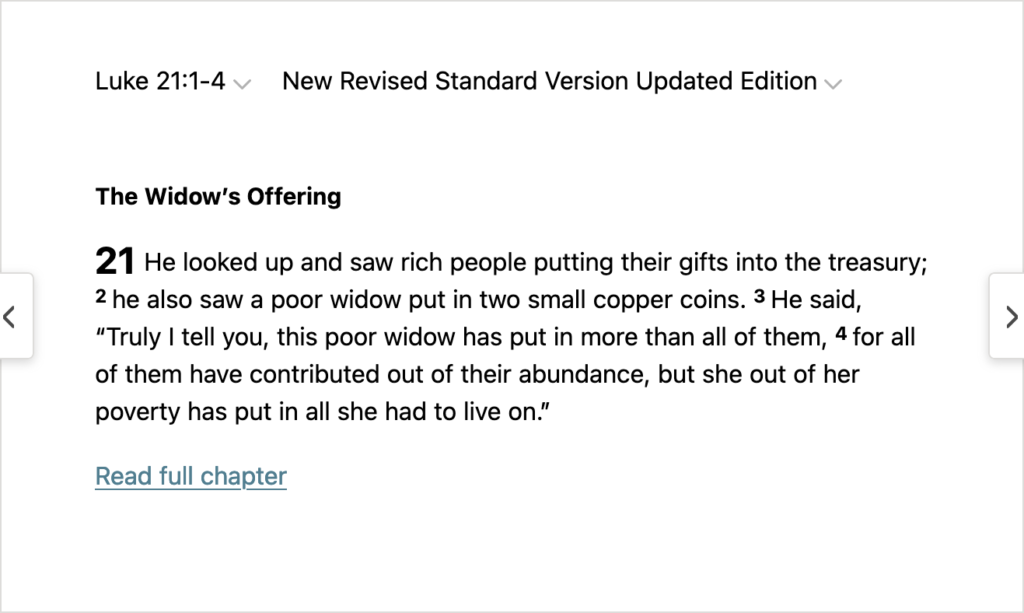
This ancient teaching tells us that generosity cannot be measured solely by the amount given. We must understand that the breadth of generosity is related not only to the absolute amount, but to the stretch made to be generous that is made – the relative sacrifice helps us to know the measure of generosity.
This is why I am a part of a spiritual community committed to justice and equity. This is why I am a part of a spiritual community committed to practices of generosity. We do not cede our understanding of generosity to the scouring winds of capitalism and the concept that the absolute more is always better. We recognize that whatever your offering, its imperfect perfection is appreciated for not just the amount, but also the stretch, also the degree to which your giving represents relative generosity, not absolute greater amount. This is what it means to be in community together, honoring the economic diversity of all who are present – those who can give more and those who can give less.
Forget the measure of perfection for an offering that is based solely on absolute amount. Remember the measure of perfection for your offering based on your willingness to stretch into a practice of generosity, what we might even call a covenantal metric.
There is a crack, a crack in everything
That’s how the light gets in
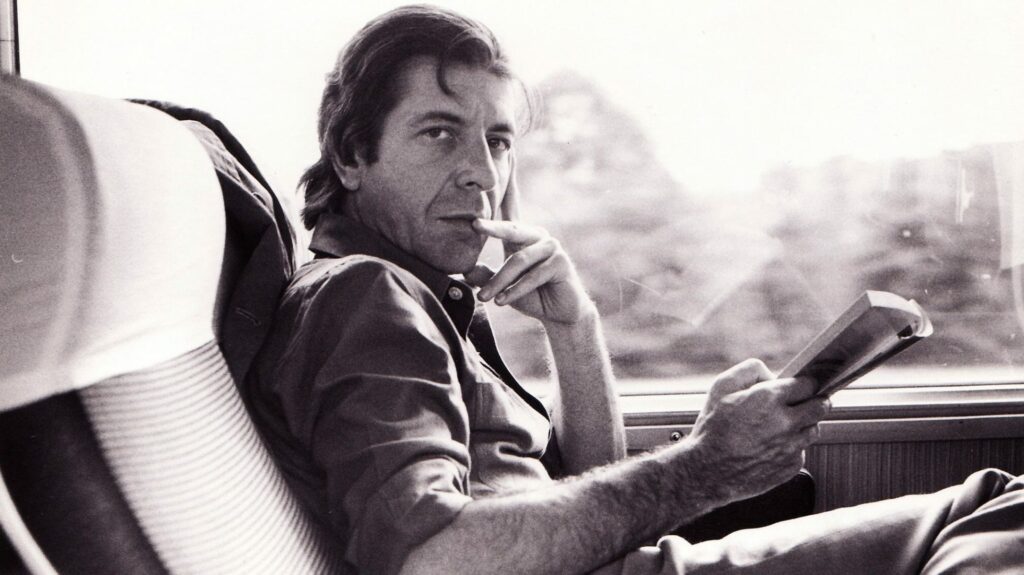
Leonard Cohen ultimately lived a wild spiritual ride, identifying across several religious traditions. However, before that wild ride, he was raised Jewish. It might have been from that upbringing that the compelling concept behind those lyrics comes. For there is an old Hasidic tale that goes like this:
A disciple asks the rebbe: “Why does Torah tell us to place these words upon your hearts? Why does it not tell us to place these holy words in our hearts?”
The rebbe answers: “It is because as we are our hearts are closed, and we cannot place the words in our hearts. So we place them on top of our hearts. And there they stay until, one day, the heart breaks and the words fall in.”.
At one of the Meet & Greets I have been attending this year to get to know congregants, someone shared with me that they had heard in a sermon (several ministers ago) something made this person feel proud: compared to other religions, Unitarian Universalists are more likely to give to causes they care about than to their own faith.
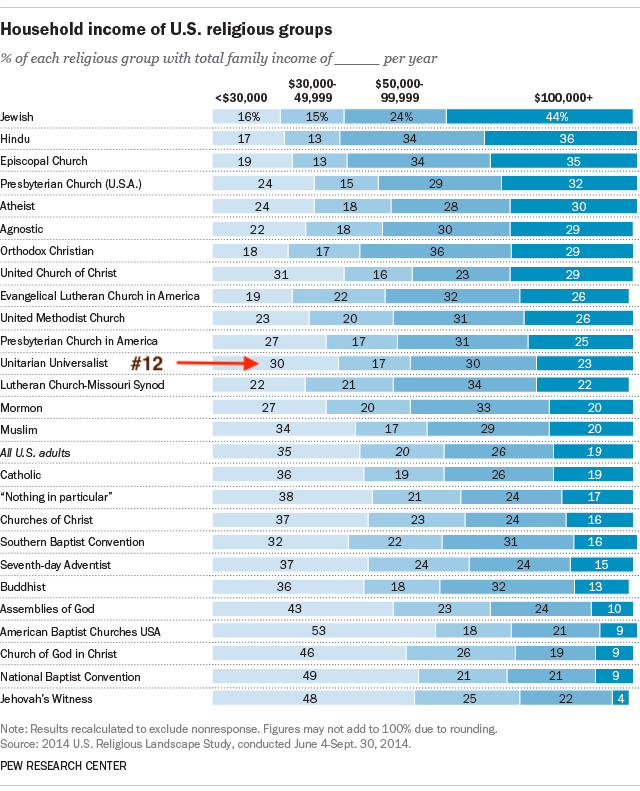
In the mid-1990s, there was data** that said that while UUs were second highest when it came to income among American religions, we were dead last when it came to giving to our own faith. Now, we are no longer that high when it comes to income (see graphic) – relative to other religious groups, we are more in the middle of the pack, according to Pew Trust, which tracks these things. However, the pattern of giving less to our own faith than other religions – I checked in with one of our UUA staffers whose job it is to know about such trends. She told me that there’s no reason to think that this pattern has changed.
I understand why this congregant feels a sense of pride about being a part of a group that gives support to other organizations helping to make our world a better place. Generosity and making our world a better place: both good things.
Yet, here’s the part that breaks my heart just a bit, that deepens the cracks there: if UUs don’t give to Unitarian Universalism, who will? If congregants don’t prioritize giving to their own congregation, who will?
I want to give you ~ members AND friends of this congregation ~ permission to forget your perfect offering. Yet I also want you to remember how necessary your offering is.
You can add up the parts
But you won’t have the sum
You can strike up the march
There is no drum
Every heart, every heart
To love will come
But like a refugee
We are starting off our canvas season this year with radical welcome: yes, we are asking for our financial support while recognizing that what each of us has to bring, no matter how large or how small, is enough and never perfect. That asking and giving and receiving is, at its core, a paradoxical, perhaps even contradictory, endeavor: for while we honor and affirm that what we give ourselves is enough, we also affirm and emphasize that the inconvenient reality is, we need more.
I don’t love giving the Sermon on the Amount, a crass and clever name for what is expected of parish ministers as part of pledge season. Yet here we are, and I don’t love it.
And I don’t believe in it. I don’t believe it works. Not in the way we hope, which is that I will find the exact right words to inspire you to open your checkbooks or electronic wallets and make more of a pledge than you would have before you heard today’s sermon.
However, there are some things I do believe in:
I do believe that we will be generous. Imperfectly perfectly so.
I do believe that if we each commit to some intentional discernment and reflection, more of us will be as generous as we possibly can. And research backs this up.
Also backed up by research, I do believe that most of us will rely more on habit than discernment to figure out just how much money we can give (or that we can grow to give over time), unless we are asked and prompted and reminded into that intentional discernment.
I do believe that we will find our way, over and over again, some years with drama, some years with joy, to financially sustain this congregation so that it is here for decades (and hopefully centuries) to come. That is what our imperfect offerings make probable.
And what I personally hope – and what I wish we as a community will communally aspire to – is that we do something even more perfect with our imperfect offering: and that is to sustain a thriving, RELEVANT congregation that is innovative.
A congregation that is attentive, within its walls and outside its walls, shifting and responding to the huge cultural shifts in our midst.
A congregation that lets the light get in, working with our own personal and institutional cracks, turning them from potential damage into synergy and possibility. Turning them into refuge for how we respond to the climate constrictions already upon us. Turning them into an incubator for doing our part to help the City of Burlington respond with compassionate welcome to those in most need.
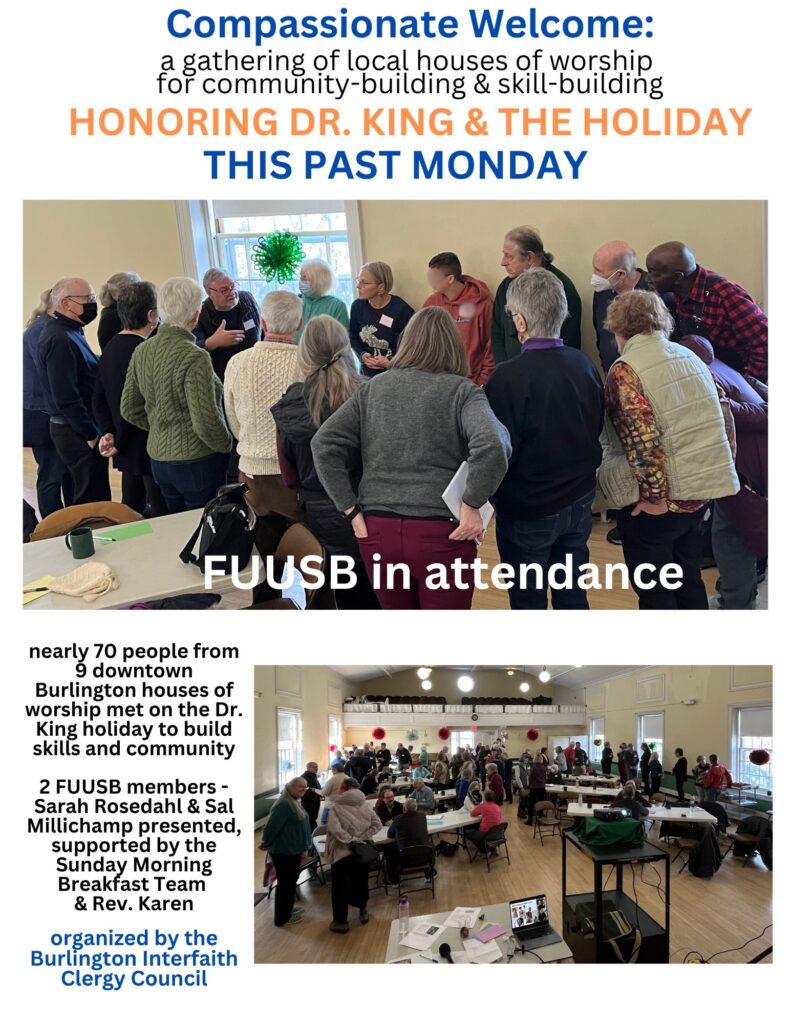
Side note: did you know that members of the Sunday Morning Breakfast Team, along with some help from me, helped to bring together 9 houses of worship from downtown Burlington – about 70 people altogether – on the Dr. King holiday to practice the skills of compassionate welcome. And to dream about how we, as faithful members of the community, can do more in response to the changes of our city. I was so proud to be associated with First UU on that day – and I think you could and should be, too.
That is what our collective and sustained imperfect perfect offering makes possible, especially as we stretch our practices of generosity.
Ring the bells that still can ring
Forget your perfect offering
There is a crack, a crack in everything
That’s how the light gets in
Today we kick off our pledge season. Each Sunday this month, we will hear from a member of the congregation, as we did today from Tom Hyde. It is our hope that these testimonials will resonate with you and your own journey of financial stewardship of this place and this people.
In two weeks or so, you will receive a stewardship letter via the USPS. We ask you to use it to spark a time of discernment about what you can stretch to give to sustain this congregation. Since the pandemic started, we have asked you to keep your pledge steady. This year, we are asking you to increase your pledge, if that is within your means.
And come Sunday, March 3rd, (please mark your calendar to attend that Sunday service) we will join together to celebrate all our imperfectly perfect forms of generosity – those of us stretching now, those of us stretching over an extended period of time, those of us considering stretching, and those of us who are as stretched as we can be at this time. All our generosity.
By celebrate, I mean that we will have an abundant coffee hour. By which I mean, James is putting together a house band (!!!) and I am intent on asking you to create a Generosity Parade, where you dance forward your pledge card (or a piece of paper that represents your pledge for the 2024-25 year). I want us to have fun and to celebrate – awkwardly, elegantly, joyfully, and otherwise – the deep wells of generosity that exist and are the heart engine of this amazing congregation. For, and I am quoting Parker Palmer as I say this,
In the human world, abundance does not happen automatically. It is created when we have the sense to choose community, to come together to celebrate and share our common store. Whether the scarce resource is money or love or power… the true law of life is that we generate more of whatever seems scarce by trusting its supply and passing it around.
He concludes
Community doesn’t just create abundance – community is abundance. If we could learn that equation from the world of nature, the human world might be transformed.
Look to your left and your right. Look behind you. Risk making eye contact with your neighbor, knowing that our collective generosity feeds not only ourselves, but our neighbors, because we choose to make it so.
May we store the gifts of our personal economies in, not the stomach of our neighbor, but the safe holding place of this Place and this People.
May every crack be an opening that lets the unexpected reach us.
May our generosity become the possibility of innovation and the realization of relevance.
May we each bring our broken Hallelujahs here.

** UUs are statistically the second highest paid income group [Barry A. Kosmin and Seymour P. Lachman, “One Nation Under God: Religion in Contemporary American Society” (New York: Crown Publishers, 1993) 260] and dead last in terms of giving to support our own faith as compared to other faith groups [Dean Hoge, ed. “Money Matters: Personal Giving in American Churches” (Louisville: Westminster John Knox Press, 1996) 12].
